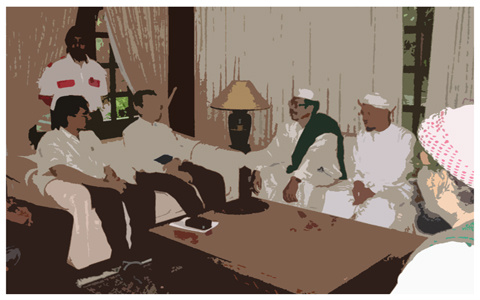A missing link in peace talks with the separatists
 It is saddening that the issue about peace talk or peace dialogue between representatives of the Thai state and the separatist groups in the far South has been heavily politicized to the extent that the peace process itself seems to be swept under the carpet.
It is saddening that the issue about peace talk or peace dialogue between representatives of the Thai state and the separatist groups in the far South has been heavily politicized to the extent that the peace process itself seems to be swept under the carpet.
There were allegations that the peace talk secretly held in Malaysia between ousted former prime minister Thaksin Shinawatra and some leaders of the Pattani United Liberation Organisation (Pulo) or between Pol Colonel Thawee Sodsong, secretary-general of Southern Border Provinces Administration Centre and Thai-Malay Muslims working in tom yam gung restaurants in Malaysia might be the cause of the March 31 bomb blasts in Hat Yai and Yala province. So far, there has not been a single shred of evidence to back up the allegations.
Thaksin himself has denied about the peace talk insisting that he is now an unemployed person and has no position of authority in the government whereas Thawee insisted that his meeting with the Thai-Malay Muslims had nothing to do with the separatist movement but only intended to help them, estimated to number more than 200,000, obtain work permits in Malaysia.
The truth and experiences from conflicts solving throughout the world have clearly indicated that every conflict should be settled on the negotiating table not through the barrels of the guns. And these can be applied to the armed conflict in the far South.
As a matter of fact, all the governments from the past to present, the military or the National Security Council have engaged in low-level peace talk with the southern rebels.
The only mistake seems to be that there has never been a consensus among the authorities concerned about the peace talk. In many cases, the authorities who did the talking did not have the full authority or they were not authorized by the government. Hence, all the peace talks or dialogues have ended a complete failure.
Take a look at the policy for the administration and development of southern border provinces for the years 2012-2014 which was drafted by the NSC and approved by the cabinet and the parliament respectively.
The policy clearly states the need to build up an atmosphere conducive to peace talk in search of a solution to the conflict. It also guarantees the right of participation in the peace process by all stakeholders. It however notes that there must be a consensus within the government over the peace talk.
Despite the clear policy in support of dialogue as a means to resolve the conflict, the only thing which has been missing is the lack of consensus. Hence, is it possible that from now on either the government or the NSC set up an ad hoc committee responsible for engaging in peace talk with the separatists.
However, the military and some sectors of the society may feel that peace talk represents a defeat for the Thai state or a submission to the separatists. This misunderstanding must be cleared up with the military by the government or the NSC. In fact, peace talk represents the beginning of a durable victory.
More importantly, it must be clearly stated that peace talk is a separate issue from peace negotiation. There is no bargaining in peace talk.
It is believed that talks in the past between the government and the separatist groups were not peace negotiations because none of the officials involved in the talks had the authority to make negotiations.
Instead of being held in secrecy, peace talk should be held in the open so that it will be known who do the talking and whether they have the authority to do so or not.
Even if it was universally accepted that conflicts could only be resolved through dialoge, the chance of peace being restored in the far South remains as distant and elusive as ever as the extremist groups in the restive region have clearly stated that they will not talk or cooperate with the government and that war is the only option to realise their dream of an independent state.
